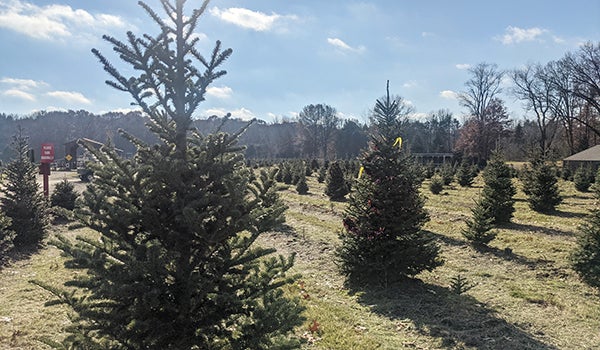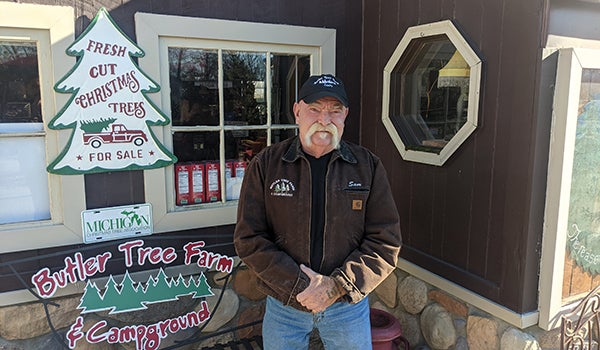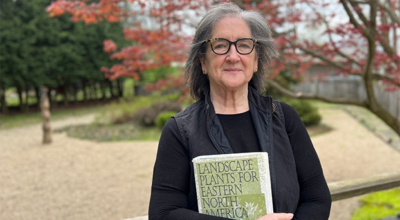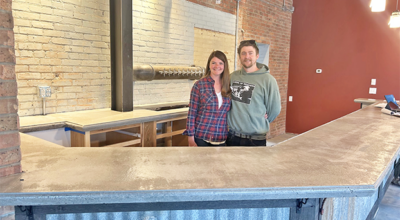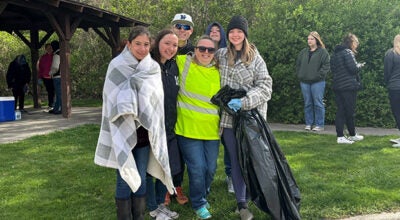Dowagiac tree farm stands tall amid Christmas tree shortage
Published 11:31 am Wednesday, December 1, 2021
|
Getting your Trinity Audio player ready...
|
DOWAGIAC — Sam Butler, of Butler Tree Farms, gestured over to the sprawling field of Fraser Fir trees fanning out as far as the eye could see.
“It’s the best tree on the market,” he said. “It’s the Cadillac of Christmas trees. It has the best needle retention of any tree out there. You cut those in late October and ship them to the big stores, and they still won’t drop their needles.”
It takes approximately nine to 11 years for Frasers to reach the market but many are being cut before they are ready to go to market. Like many in the Christmas tree industry, Butler Tree Farms, 21515 Crane St., Dowagiac, is struggling with supply issues due to factors including increased demand for trees, supply chain gridlock and climate change.
“This business has doubled in the last 10 years or so,” Butler said. “At one time, every block out here had seven to 14-foot Frasers everywhere. A lot of my customers are from Chicago. They have cathedral ceilings and they’re looking for height.”
Butler said more than 30,000 trees are currently planted on the farm, which also features a petting zoo, wagon rides and a gift shop in the winter season and offers a pumpkin patch in the fall season. The farm is open 1 to 5:30 p.m. Monday to Friday and 10 a.m. to 5:30 p.m. Saturdays and Sundays until Christmas Eve for the winter season.
Visitors have their choice of nine different types of trees and can cut their own trees or pick from a selection of pre-cut trees.
After a record setting season last year spurred by the ongoing pandemic, the farm was bustling once again on Thanksgiving weekend this year. Due to the lack of tall Frasers on the main farm, Butler was forced to dip into his off-site tree lot to cut several tall Frasers and transport them to the farm for families to purchase.
“We sold a couple hundred of those last year,” Butler said. “I’m afraid we’re gonna have to do that for a few years until we get caught back up. [Customers] want the experience of cutting the tall trees themselves, and I can’t give it to them, but at least I can offer them a tree.”
Unlike most years, the farm did not offer an early tree sale to ensure it had enough supply for the season. Butler said he even considered not offering pre-cut trees for one year to allow the trees to have an extra year of growth.
“It used to be that if the trees weren’t over 10 feet, they were eight or nine,” he said. “Now, I see the same customers are cutting them at six or seven feet. They would prefer them a little taller, but it’s a Fraser, so they don’t complain. Our smaller trees are leaving because that’s all I got right now but then again, for every tree that comes out, that’s one more I’m not gonna have for next year.”
The supply issues extend into other areas of the farm, including wreaths and gift store items.
“There’s all kinds [of supply issues],” he said. “The things that we really have to have like, netting for the trees and things like that we’re able to get, but I never know if I’m gonna get something I need or not.”
Since planting his first trees with his wife, Brenda, in 1997, Butler can hardly believe the farm has grown into what it is now.
“My vision was to put a little camper up here with my coffee thermos and plant a couple hundred trees and sell them for twenty bucks apiece,” Butler recalled. “It has since evolved into this. Now we have customers driving from Chicago and beyond because they want a beautiful Christmas Tree for a good price.”
For Butler and his family, the tree farm has become more than just a tree farm. It has become a destination experience for families from Michiana and beyond to kickstart the holiday season.
“A newborn baby was brought here for the first time,” he said. “We watched that baby turn into a teenager and watched that teenager get married and bring her own family.”
Initially concerned for the future of the tree farm industry, Butler has changed his tune after seeing young families seek out real trees both as a family event and as a means to avoid the environmental impacts that come with artificial trees.
“When the culture changes, people tend to go out of business,” he said. “But I’m seeing so many young people who enjoy this that I don’t think I have to worry.”


